Empowering Women in the Field: Radha’s Story
by Jacob Brescia-Weiler
On a hot morning in early June, seated in front of her home surrounded by family and neighbors, Radha Purkoti of Ratmata, Mandan Deupur Municipality, Kavre, shared with me her progress in improving her and her family’s lives.
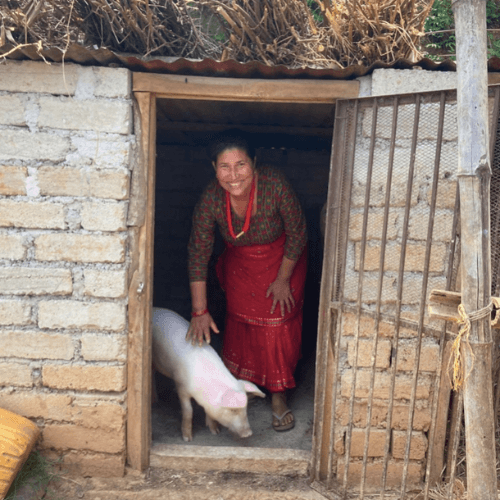
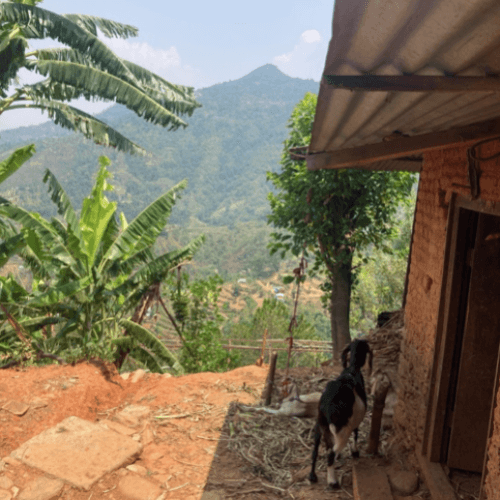
Radha is a livestock and vegetable farmer in the Kavrepalanchok District of Nepal. She has been a member of the Jaruwa Sustainable Farming Group since its founding in 2016. Comprised of 28 members, the group is one of 27 women’s savings and credit and farming collectives supported by Groundswell International and its partner organization, BBP Pariwar, in this district. Radha’s group has assets collected from the members in order to mobile for income generating activities, enrolling their children in schools and treatment.
Groundswell Programs Empower Women
After hearing of the progress of similar groups in neighboring villages in improving women’s lives, Radha was motivated to join her local group to reap the same benefits through solidarity, collective work, and savings and credit cooperative finance. In addition to supporting setting up these women’s savings and credit groups, Groundswell and BBP Pariwar offer support with technical training in ecological farming, accessing seeds and livestock, and facilitating exposure visits so the women can learn from other farmers. They are working with these groups toward the shared goal of sustained self-sufficiency and long-term resilience.
Along with mobilizing savings and credit and increasing their agricultural production, the program supports the women farmers in these 27 groups in accessing livestock and increasing their incomes.
For example, a year ago, Groundswell and BBP Pariwar supported Radha with loans and partial subsidies for two pigs. She received 7,000 Nepalese Rupees (NPR) [about US$53.30] for each pig up front, and was given nine months to repay 70% of the loan with 2% interest, a much lower rate than local money lenders. She repaid 4,900 NPR, or about US$37.30. This process allows farmers like Radha to be able to purchase livestock they could not otherwise afford while ensuring a sense of ownership and allowing them to grow their assets.
The loan repayments allow BBP Pariwar to maintain and grow a revolving fund to continue to support other farmers in need with access to pigs and livestock. Along with Radha, three other women in her group have received similar support to obtain two pigs each over the last year.
“We are confident that increasing numbers of women will continue to benefit from this revolving livestock fund each year,” said Gopal Nakarmi, Groundswell’s Regional Coordinator for South Asia.
“Before, I primarily earned a living selling buffalo milk and goats in local markets,” Radha said about the impact the revolving pig fund has had on her life.
“On average, it takes a year to raise and sell a goat for around 25,000 NPR each (about US$190.40). Comparatively, pigs are faster to raise and procure a higher profit than goats,” she explained.
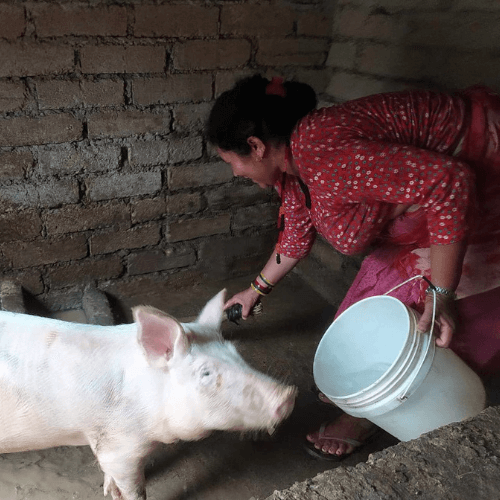
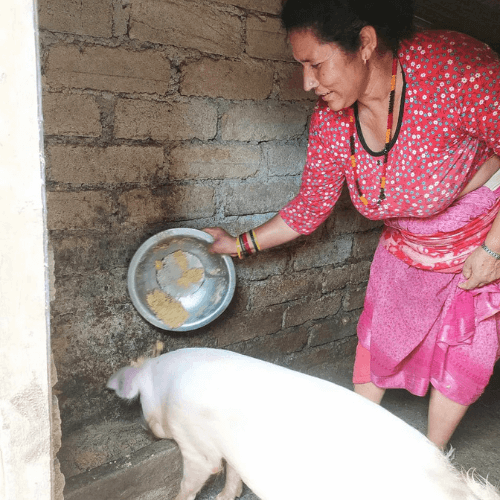
Within eight months, she was able to raise the two pigs and sell them for a combined 85,000 NPR (about US$647.50, US$323.75 each).
“During this period, I spent 18,000 thousand NPR (about US$137.10) of my own, which I saved in our savings and credit cooperative, as well as my time and energy in raising the pigs,” Radha said. She increased her income by over US$510.
Thanks to her involvement in pig husbandry and the savings and credit cooperative, Radha has added significantly to her personal savings in the last year. Whereas her husband has historically been the primary breadwinner in the family, Radha is now able to make a more substantial financial contribution to her personal and family expenses, strengthening her sense of autonomy and decision-making power in her family and community.
On a personal level, Radha shared that her newfound success has fostered a sense of empowerment and self-development. “I have overcome my anxiety of interacting with others,” Radha noted with a proud smile. “I speak more freely and confidently now.”
It was clear from the reactions of her loved ones that they had observed the same growth.
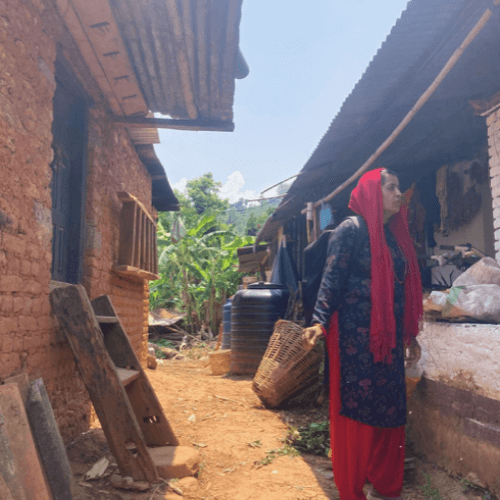
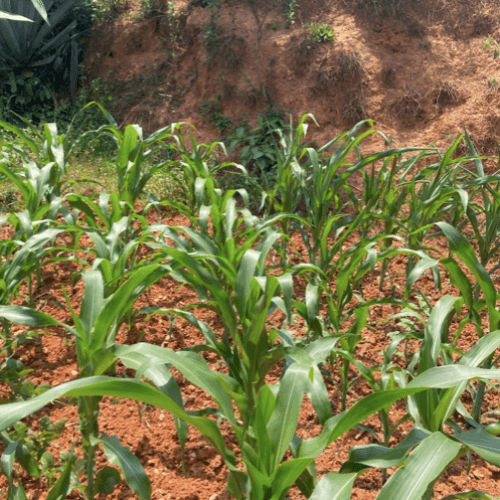
Radha has also reinvested her profits into agroecological farming techniques to improve her production. She now has a livestock shed to protect animals from disease and facilitate the collection of cow urine and manure, which she uses in biofertilizers and biopesticides. She erected a plastic tunnel to grow tomatoes and extend her growing season, and she is harvesting more produce and fodder this year than she ever has.
Resilience Through Obstacles
Of course, Radha and families like hers in the area continue to face challenges. The local market for pork is limited, in part because the meat is considered appropriate only for the Dalit, or Untouchable, caste. This is particularly true in rural areas where caste expectations remain more rigid. The demand for goat meat is higher in local areas, but it has also seen a drop in recent years.
Another major obstacle rural families face is transportation. Every morning, Radha’s husband travels 1.5 hours on foot to deliver buffalo milk to the local market. Farmers who cannot produce fodder for livestock on their own farms must travel about 5 kilometers (about 3 miles) to the nearest village to buy it. Transportation is complicated by poor road conditions, especially during the monsoon season when landslides and road blockages increase.
Given the remoteness of their community and the lack of services, limited access to veterinary care is also a challenge for farmers. Another member of Radha’s farming group who also received two pigs from the revolving fund, lost one to dysentery.
“I traveled to the nearest village and explained the symptoms to the veterinary technician, but the medication he gave me didn’t help.”
The veterinarian finally paid a home visit to administer an injection to the sick pig, but it died a few days later.
“Over the course of seven months, I spent 16,000 NPR (about US$121.85) to raise one pig and sold him for 35,000 NPR (US$266.60). I earned money, but I could have earned much more from selling two pigs.”
To address this challenge, Groundswell and BBP-Pariwar support training young women as para-vets who can provide veterinary services to local farmers.
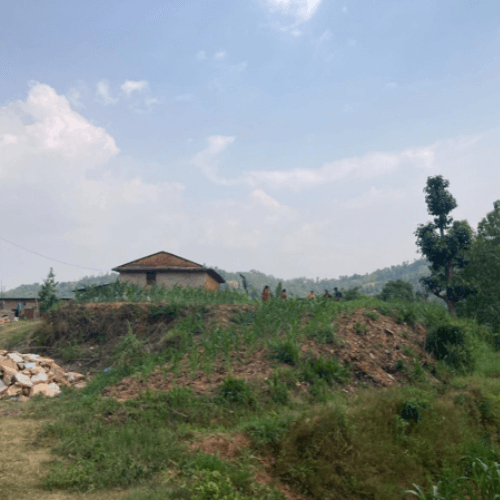
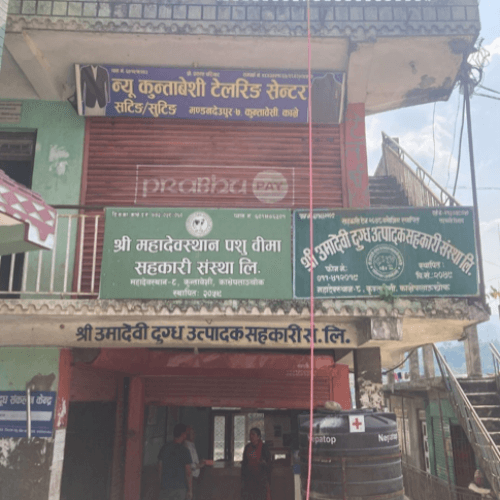
Looking Towards The Future
Radha also reflected on her hopes for the future.
“I’d like to have fencing around our land, to protect from grazing animals. We also need help making it easier to sell our produce – maybe setting up a market right here in our community, establishing connections with wholesale sellers, or hiring a middleman to transport goods to market.”
With a laugh, she added that she hoped to receive another pig from the revolving fund down the line.
Navraj Upadhyaya, Groundswell’s Assistant Regional Coordinator for South Asia, passionately encouraged Rhada to continue to build her self-sufficiency, think bigger, and strive for continued growth.
“Opportunity is something you are creating.”
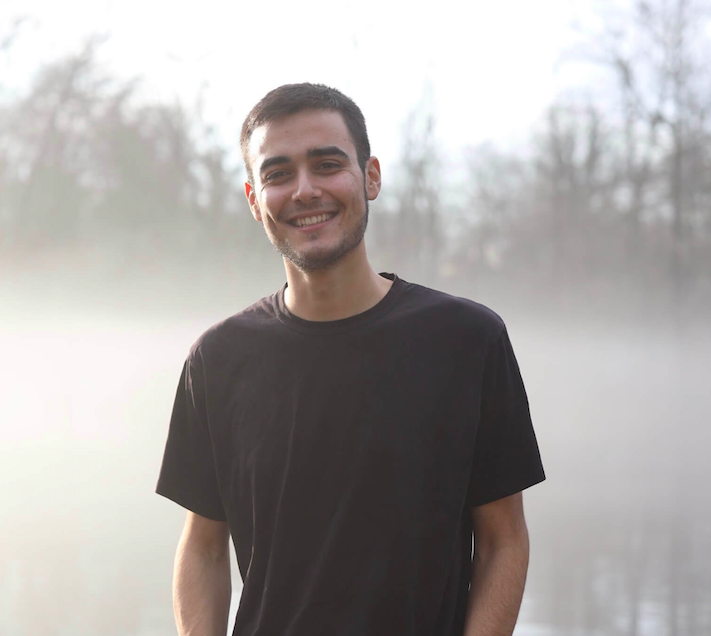
About the Author
Jacob Brescia-Weiler, son of Groundswell’s Executive Director and Co-Founder Steve Brescia, graduated from Tufts University in 2017 and has worked to provide legal and support services to immigrants in Guadalajara, Mexico, New York City, and the Washington, DC area. He will attend UC Davis Law School in August 2023. He spent the last year working and traveling in Vietnam. He is grateful for the opportunity to visit Groundswell’s Nepali partner, BBP Pariwar, and learn about the work of women’s self-help groups.
